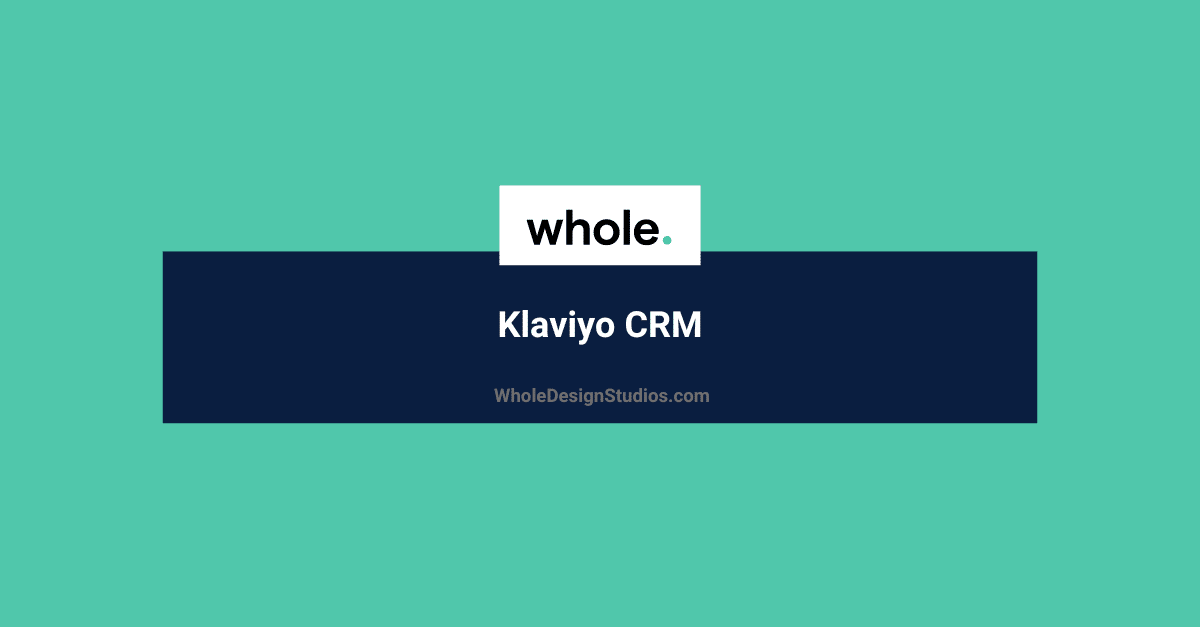
Klaviyo CRM is a marketing tool that combines email and SMS automation with CRM-like features. It creates detailed customer profiles, enables audience segmentation, and personalizes messaging to boost engagement and drive sales.
In the world of digital marketing, finding the right tools to streamline your customer relationship management (CRM) and email marketing efforts is crucial. When it comes to email marketing solutions, many businesses often ask, “Is Klaviyo a CRM or an ESP?” Understanding this distinction is essential to maximizing your marketing efforts and driving higher returns on investment (ROI) through personalized customer engagement. In this post, we’ll dive deep into Klaviyo’s CRM capabilities, compare its features to those of traditional CRMs, and explain how it can benefit your business.
CRM, or Customer Relationship Management, refers to software designed to manage interactions with current and potential customers. It consolidates data from various touchpoints—such as email, social media, and website interactions—into one central location. CRMs play a critical role in sales, customer service, and marketing, helping businesses understand customer needs and enhance relationships.
While traditional CRMs focus on comprehensive data management, including sales pipeline tracking and customer support, an ESP (Email Service Provider) like Klaviyo specializes in sending bulk emails, automated messages, and segmenting audiences based on their engagement.
Klaviyo is primarily recognized as an ESP with powerful capabilities to handle email campaigns, automated sequences, and targeted communications. However, it also offers several CRM-like features that allow you to manage customer data effectively. Klaviyo tracks user interactions, creates detailed customer profiles, and segments audiences based on their behavior, blurring the lines between a CRM and an ESP.
Despite its CRM-like features, Klaviyo’s main strength lies in its email marketing capabilities. For businesses seeking a full-scale CRM system, pairing Klaviyo with a dedicated CRM platform like Salesforce or HubSpot might be the best approach to achieve a holistic view of customer interactions across all touchpoints.
Klaviyo’s CRM functionalities come with several advantages that can significantly boost your marketing and customer engagement efforts:
Klaviyo creates dynamic customer profiles that update in real-time, tracking every interaction a customer has with your brand. These profiles include data points like purchase history, web activity, loyalty points, and predictive analytics for churn risk and future order dates.
Klaviyo’s smart profile merging technology ensures you have a clean, consolidated view of each customer, avoiding duplicate profiles and data errors. With server-side tracking, Klaviyo keeps your data accurate, even when web browser tracking limitations come into play.
Using AI technology, Klaviyo enriches customer data with predictions about customer behavior. This allows you to anticipate your customers’ needs, trigger win-back campaigns, and send personalized messages to increase engagement.
Combining Klaviyo with a Customer Data Platform (CDP) can unlock even more potential for data-driven marketing. While CRMs focus on managing customer relationships, CDPs gather and analyze behavioral data to provide deeper insights into customer preferences and interactions.
Ecommerce brands across various industries have successfully used Klaviyo to enhance their customer relationship management and drive personalized marketing campaigns. These companies leverage Klaviyo’s segmentation and automation tools to increase engagement and conversion rates.
Klaviyo offers CRM-like features but is primarily an Email Service Provider (ESP) designed to enhance marketing and customer engagement. Klaviyo’s capabilities include creating detailed customer profiles, segmenting audiences, and using AI-driven predictive analytics to deliver personalized email and SMS campaigns. While it provides some CRM functionality, such as data centralization and tracking customer interactions, it lacks the comprehensive sales and customer support features typically found in full-scale CRM systems like Salesforce or HubSpot.
Klaviyo is neither a full CRM (Customer Relationship Management) platform nor a CMS (Content Management System). Klaviyo is best classified as an Email Service Provider (ESP) with robust CRM-like capabilities, focusing on email and SMS marketing automation, customer data segmentation, and personalized communication. A CMS, like WordPress or Shopify, is designed for creating and managing website content, which is not Klaviyo’s primary focus.
Shopify itself is not a CRM but rather a comprehensive ecommerce platform designed to help businesses create and manage their online stores. However, Shopify does include some basic CRM-like features, such as tracking customer interactions, managing customer orders, and viewing purchase histories. For more advanced CRM capabilities, many Shopify users integrate third-party CRM tools like Klaviyo, HubSpot, or Salesforce into their Shopify store to handle more detailed customer relationship management.
A CRM (Customer Relationship Management) platform is software that helps businesses manage and analyze customer interactions and data throughout the customer lifecycle. The primary goal of a CRM platform is to improve customer relationships, drive sales growth, and enhance customer service by centralizing data from various touchpoints like emails, social media, phone calls, and in-person interactions. CRM platforms typically offer features for contact management, sales pipeline tracking, customer support, marketing automation, and analytics to provide a comprehensive view of customer engagement. Examples of popular CRM platforms include Salesforce, HubSpot, and Zoho CRM.
To measure the success of CRM implementation with Klaviyo, focus on these key metrics:
Klaviyo offers a wide range of integration options to ensure seamless connectivity with various platforms, including:
Customer profiles in Klaviyo play a crucial role in enhancing personalized marketing by:
These elements work together to ensure your marketing efforts are more relevant and impactful, driving higher engagement and conversions.
Klaviyo occupies a unique position as an ESP with robust CRM-like features, enabling businesses to execute personalized email campaigns while managing customer data effectively. For companies looking to take their customer engagement to the next level, combining Klaviyo with a full-scale CRM system could be the ideal solution. Whether you focus on email marketing or comprehensive customer management, Klaviyo offers a powerful platform to build stronger relationships with your audience.
Ready to explore Klaviyo’s CRM capabilities? Sign up for a demo and see how it can transform your customer engagement strategy!